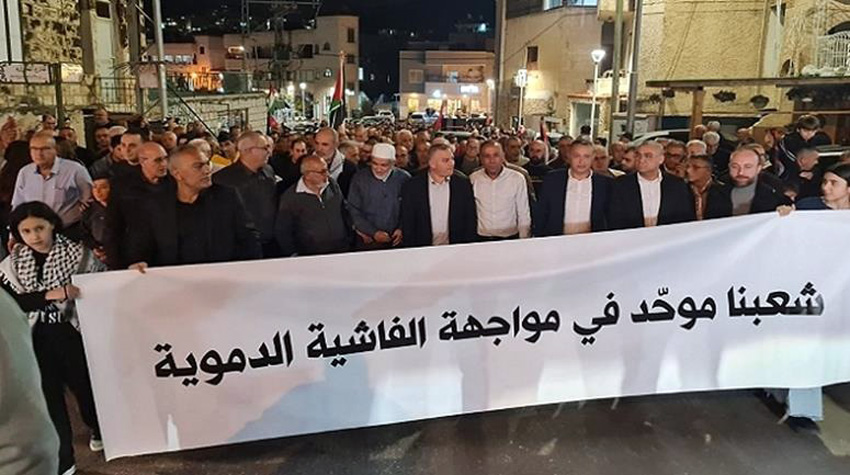
A GROUP of hundreds of Israeli economists have issued a fresh warning that a financial meltdown could occur more ‘powerfully and faster’ than they had originally forecast – because a controversial and far-reaching judicial shakeup being advanced by prime minister Binyamin Netanyahu’s hard-right coalition could have grave implications.
‘Since we published our first petition, there are many growing indications that the damage to the economy could manifest itself more powerfully and faster than we expected,’ the second letter warned on Thursday.
‘Even if the markets eventually stabilise in the short term, experience from other countries where judicial and financial institutions were harmed, and research from recent decades shows that we can expect long-term damage to economic growth and Israelis’ standard of living.
‘It is still not too late to stop the train before it leaves the station,’ they said.
Recent weeks have seen the Israeli shekel value drop to a three-year low against the dollar, Tel Aviv Stock Exchange underperform and leading companies pulling their money from Israeli accounts.
An estimated 160,000 protesters took to the streets of Tel Aviv over the weekend, with tens of thousands more gathering in other Israeli cities, demonstrating against the governing coalition’s planned legal reform, which would significantly weaken Israel’s judiciary.
Among the signatories of the letters were both right- and left-leaning senior academics, including Nobel Prize winner Daniel Kahneman; former Netanyahu economic adviser and National Economic Council head Eugene Kandel and former two-term Bank of Israel governor Jacob Frenkel.
In their first letter, the economists warned that the radical measures could lead to reduced investments in the booming Israeli tech industry.
They also invoked the risk of a ‘brain drain’ and the relocation from the occupied territories of research and development centres, as well as the danger of a reduction in the Israeli regime’s credit rating.
The Israeli former prime minister Ehud Barak says Israelis must resist the current regime.
On Wednesday, American credit rating agency Fitch Ratings Inc. warned that the planned judicial changes could have a ‘negative impact’ on Israel’s credit profile.
Fitch cautioned that the judicial reform could weaken institutional checks, leading to ‘worse policy outcomes or sustained negative investor sentiment.’
Weeks of protests in Israel turned violent on Wednesday for the first time as police fired stun grenades and a water cannon at demonstrators who blocked a Tel Aviv highway.
The violence came as thousands across the occupied territories launched a ‘disruption day’ against the plan to overhaul Israel’s judicial system.
In the first scenes of unrest since the protests began two months ago, police arrived on horseback in the centre of the seaside metropolis of Tel Aviv, hurled stun grenades and used a water cannon against thousands of protesters who chanted ‘police state.’
A video posted on social media showed a police officer pinning down a protester with his knee on the man’s neck and another showed a man who reportedly had his ear ripped off by a stun grenade.
Critics, including influential business leaders and former military figures, say Netanyahu is pushing Israel toward authoritarian rule and has a clear conflict of interest in targeting judges as he stands trial on corruption charges.
The rival sides are digging in, deepening one of Israel’s worst domestic crises.
The overhaul has sparked an unprecedented uproar, with weeks of mass protests, criticism from legal experts and rare demonstrations by army reservists who have pledged to disobey orders under what they say will be a dictatorship,
The former head of the Israeli military intelligence division Amos Yadlin said Israel is eroding internally.
In an interview with the Channel 12 of the regime, Yadlin said, ‘Israel is heading to a bad place.’
Hamas expresses outrage over the Israeli regime’s approval of a draft bill that, if signed into law, would authorise the execution of the Palestinian detainees, who perform anti-occupation operations.
The Palestinian resistance movement issued the reaction in a statement on Wednesday after Knesset (the Israeli regime’s parliament) approved the draft, which has been proposed by far-right Israeli minister Itamar Ben-Gvir in a preliminary reading.
The group denounced attempts at the legislation of executions as the Israeli regime’s bid to legalise its systematic killings of the Palestinian people – the Palestinian Information Centre news agency reported, citing a Hamas statement.
‘Such a racist and criminal move reflects the Israeli occupation government’s fascist tendencies,’ the group said.
‘It represents an extension of the summary executions carried out by the Israeli occupation army in cold blood under the nose of the whole world,’ it said, emphasising that international law criminalises killing on a discriminatory and racist basis.
Hamas vowed that such policies would not deter the Palestinian people from exercising their right to resistance against the occupying regime and its illegal settlers.
The Israeli regime’s forces and settlers have escalated their deadly acts of aggression against the Palestinians since late December 2022, when Binyamin Netanyahu staged a comeback as the regime’s prime minister at the head of a cabinet of hard-right and extremist parties.
The Israeli finance minister has called for the destruction of a village targeted by a recent deadly settler rampage.
Also on Wednesday, Israeli forces attacked the Aqabat Jabr refugee camp near the city of Jericho in the eastern part of the Tel Aviv-occupied West Bank, fatally wounding a man, whom the regime has accused of killing an Israeli-American motorist earlier.
Mahmoud Jamal Hassan Hamdan, 22, died from ‘serious wounds inflicted by bullets of the occupation’ during the raid, the official Palestinian Wafa news agency reported.
Hamdan’s death took the number of the Palestinians killed by Israeli forces and settlers since the beginning of the year to 67, including four who were killed by Israeli settlers’ gunfire, 13 children, four elderly people, and one prisoner.
At least 21 of the fatalities were caused during two separate mass raids carried out by the Israeli troops on the cities of Nablus and Jenin, both in the northern part of the West Bank, earlier this year.